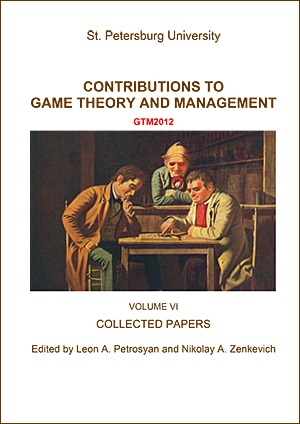Pricing and Transportation Costs in Queueing System
Abstract
A non-cooperative four-person game which is related to the queueing system M/M/2 is considered. There are two competing stores and two competing transport companies which serve the stream of customers with exponential distribution with parameters μ 1 and μ 2 respectively. The stream forms the Poisson process with intensity λ. The problem of pricing and determining the optimal intensity for each player in the competition is solved.
Keywords:
Duopoly, equilibrium prices, queueing system
Downloads
References
D'Aspremont, C., Gabszewicz, J., Thisse, J.-F. (1979). On Hotelling's "Stability in Competition". Econometrica, 47, 1145–1150.
Mazalova, A. V. (2012). Hotelling's duopoly on the plane with Manhattan distance. Vestnik St. Petersburg University, Ser. 10, pp. 33–43. (in Russian).
Altman, E., Shimkin, N. (1998). Individual equilibrium and learning in processor sharing systems. Operations Research, 46, 776–784.
Levhari, D., Luski, I. (1978). Duopoly pricing and waiting lines. European Economic Review, 11, 17–35.
Hassin, R., Haviv, M. (2003). To Queue or Not to Queue / Equilibrium Behavior in Queueing Systems. Springer.
Luski, I. (1976). On partial equilibrium in a queueing system with two services. The Review of Economic Studies, 43, 519–525.
Koryagin, M. E. (1986). Competition of public transport flows. Autom. Remote Control, 69(8), 1380–1389.
Saati, T. L. (1961). Elements of Queueing Theory with Applications. Dover.
Mazalova, A. V. (2013). Duopoly in queueing system. Vestnik St. Petersburg University, Ser. 10, (submitted).
Downloads
Published
How to Cite
Issue
Section
License
Articles of "Contributions to Game Theory and Management" are open access distributed under the terms of the License Agreement with Saint Petersburg State University, which permits to the authors unrestricted distribution and self-archiving free of charge.




